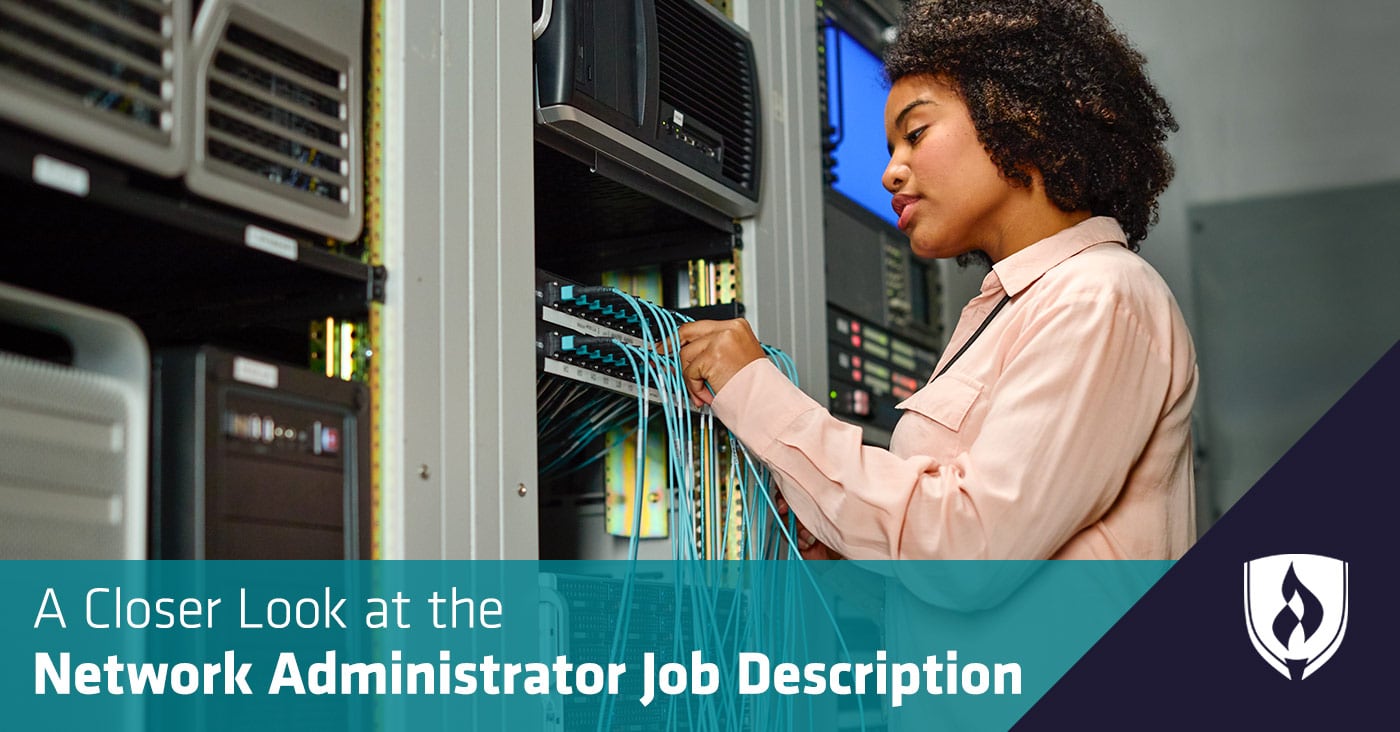
Whether you’re completely new to the IT field or just considering your next step in your career, becoming a network administrator certainly sounds like an appealing option. Practically every organization has IT needs, so stepping into a position that oversees those networking needs at a higher level sounds like a smart career goal.
But before you invest time or money into becoming a network admin, you want to know everything you can—especially the factors that job postings aren’t mentioning. We evaluated network administrator job descriptions to nail down the basics and gathered insights from IT professionals to find out all you need to know about working as a network admin. Take a moment to learn what they think you should know.
The typical network administrator job description
Network administrators play an important role in any company—no matter the industry. They’re the point-person for keeping the organization’s computer network up-to-date and running optimally. Whether this means providing suggestions on how to effectively connect or deploy various software systems or what network hardware to purchase or maintaining the security of the system, it’s all in the day’s work of a network administrator.
Common network administrator job duties
Working as a network administrator means wearing many hats throughout the day. It’s likely they’ll have to problem-solve, think strategically and communicate clearly on a regular basis. Here are a few examples of specific duties a network administrator performs, according to U.S Bureau of Labor Statistics:1
- Determine an organization’s system needs and install network hardware and software
- Maintain network and computer system security
- Train users in proper use of hardware and software
- Interpret and solve problems when a user or automated monitoring system sends an alert
- Manage organization’s servers, desktop and mobile equipment
- Ensure email and data storage networks work properly
- Make sure employees’ workstations are working efficiently and stay connected to the central computer network
Network administration skills employers are seeking
No matter the industry, network admins need a certain set of skills to get hired or even score an interview. We used job posting analysis software to examine over 126,000 network administrator job postings in order to identify some of the top skills employers are seeking.
In-demand technical skills for network administrators:2
- Systems administration
- Operating systems
- Technical support
- Network configuration
- Cybersecurity
- Cloud solutions
- Databases and programming
- Network file systems
- Scripting languages
- Virtualization
- Telecommunications
In-demand transferable skills for network administrators:2
- Basic customer service
- Project management
- Scheduling
- Software development principles
- Help desk support
- Writing
- Test automation
- Business strategy
While technical skills will help your resume meet employers’ baseline needs and hopefully get you in a position to ace an interview, your transferable skills—like problem-solving, communication and teamwork ability—will help you navigate and excel in your career beyond that point.
But don’t be discouraged if you don’t have many of the technical skills listed above. These are the kind of skills that you can gain by earning a Network Systems Administration degree.
Education and experience requirements for network administrators
While a degree will certainly help bring your technical abilities up to par, it’s fair to wonder if you could find your way into one of these positions without a formal education. The short answer to that question? Maybe—but it could pose challenges depending on your background.
Our analysis of network administrator job postings found that 90 percent of positions were seeking candidates with an associate’s degree at a minimum.3 Experience is also a big factor—this role isn’t typically entry-level and most candidates will likely need a fair amount of IT and networking experience to be considered a top tier option. Our job posting analysis found that just 23 percent of job postings were seeking candidates with 0-2 years of experience, compared to the 57 percent seeking 3-5 years of experience.3
In addition to formal education, network admin hopefuls should consider pursuing professional certifications as well.
Beyond the network administrator job description
You can only tell so much from a formal job description on paper. There are some things you can only learn from experience. Take advantage of this firsthand insight from experienced professionals.
1. Don’t discount your customer service skills
Working as a network administrator isn’t all technical skills and network systems. Working with network users to solve problems and find solutions for stakeholders while providing insight on network-wide issues requires having strong people-skills. Being friendly and personable can go a long way when working with other IT staff and with network users.
“The part [of this job] many people struggle with is the customer-facing skills,” says David Moise, president of Decide Consulting. “You do not get parodied on Saturday Night Live without there being some truth to it.”
Moise says he’s noticed some progressive managed service providers sending their network staff to “Disney-style” customer service training to improve their communication skills and responsiveness. It’s clear a greater emphasis is being placed on staff who can effectively navigate personal interactions.
2. Play the long game
While jobs in the tech industry are thriving right now and will likely continue to, that doesn’t mean they won’t change. “Focus on the skills that will be in demand over the next 10 years,” encourages Moise. If you see a demand for cyber security increasing in your field, make sure you’re grabbing the IT tickets pertaining to security. Become the go-to security expert and work to earn a job title that reflects that.
Since you won’t likely be a network administrator forever keep an eye out for other IT positions with similar duties and needed skills from DevOps engineer, site reliability engineer, cloud hosting and systems engineer. As the technology world quickly evolves, keep your eyes peeled for what’s coming and position yourself accordingly.
3. Stay up-to-date
In order to keep your skillset ready for whatever the field has in store in the next few years, you’ll need stay on top of new advances.
“There’s no magic to it,” says Andy Lipnitski, IT Director at ScienceSoft. Simply keep up with news outlets’ tech sections and blogs from the world’s leading network companies. Observe market trends and try out technologies that are gaining popularity. “If there’s a new technology on the market, don’t hesitate to experiment with it.”
4. Certifications matter
While there are more and more tech jobs available, the skills needed for each are becoming more specialized, says Moise. Certifications are often the most obvious way you can prove knowledge to a potential employer. Earning them will help you keep pace with skills and changes in the field and help demonstrate you have a deep knowledge base for hardware components and operating systems.
The Rasmussen University Network Systems Administration degree will prepare you to sit for industry certifications like:
- Cisco® CCNA
- CompTIA® A+ (parts 1 and 2)
- CompTIA Linux+
- CompTIA Network+
- CompTIA Security+
- Microsoft® Windows 10 MD-100
Start your career in network administration
Chances are high that if you’ve read through to the end, you’re still interested in possibly becoming a network administrator. That’s great! The tech world is in need of more skilled and personable individuals.
Now that you know more about the job duties and the factors you may not find in the job descriptions, maybe you’re curious about the process to actually become a network administrator. Find out in our article, “How to Become a Network Administrator: The Info You Need to Know.”
1Bureau of Labor Statistics, U.S. Department of Labor, Occupational Outlook Handbook, [accessed January, 2020] www.bls.gov/ooh/. Information represents national, averaged data for the occupations listed and includes workers at all levels of education and experience. This data does not represent starting salaries. Employment conditions in your area may vary.
2Burning-Glass.com (analysis of 126,120 network administrator job postings, Dec. 1, 2018 – Nov. 30, 2019)
3Burning-Glass.com (analysis of 16,115 network administrator job postings, Dec. 1, 2018 – Nov. 30, 2019)
Cisco is a registered trademark of Cisco Systems, Inc. and/or its affiliates in the United States and certain other countries.
CompTIA, CompTIA A+, CompTIA Network+, CompTIA Security+, and CompTIA Linux+ are registered trademarks of CompTIA Properties, LLC.
Microsoft and Windows are registered trademarks of Microsoft Corporation.
EDITOR’S NOTE: This article was originally published in 2017. It has since been updated to include information relevant to 2021.


